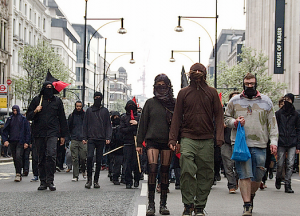London "Parody" Of Arab Spring
 Kapil Komireddi writes in Foreign Policy:
Kapil Komireddi writes in Foreign Policy:
LONDON — At around 7 p.m. on Saturday, thick clouds of smoke rose above the Lillywhites sports store on Piccadilly Circus. As the riot police rapidly formed a line to block access to lower Regent Street, bursts of embers flashed in the sky. A small mob of masked protesters raced to the police line, tried to breach it, but was pushed back. Some of them were carrying enormous red Bolshevik flags. The smoke grew thicker and some of the crowd that had gathered tried to move away. The protesters started singing: "London is burning."
More than 200,000 protesters -- among them nurses, care workers, lawyers, doctors, and a host of public sector workers bussed in by the Trade Union Congress -- had marched through central London that day, protesting the government's cuts in funding to public services. They promised to transform Trafalgar Square into London's version of Tahrir Square, the beating heart of the Egyptian revolution. Displaying placards and shouting slogans, they made their way to Hyde Park, where a dais and sound system had been erected. Just after 2 p.m., Ed Miliband, leader of the opposition Labour Party, addressed them. "We come in the tradition of those who have marched before us," he told the crowd. "The civil rights movement in America, who fought for equality and won. The anti-apartheid movement, who fought the horror of that system and won."
Eager to insert the protest into the canon of glorious resistance, Miliband omitted the small fact that he had served in the previous Labour cabinet whose actions, more than anything else, accounted for Britain's journey to the brink of bankruptcy. Nor could mere invocations of history's heroic movements obscure the fact that it is not the size of a crowd alone that confers greatness on a movement but also the forces it must combat. Since disagreements in Britain have been resolved, for at least the last 60 years, by means of fair elections, and the government, for all its ills, is accountable, ultimately, to the public, it was difficult to see anything heroic in Saturday's protest. This was the radicalism of a people who had no experience of tyranny, a self-congratulatory excursion in democratic dissent, a weekend trip to the city.
Click here to read more.

